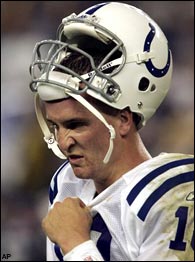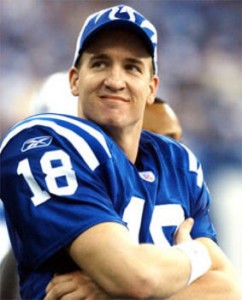The Indianapolis Colts’ 38-35 overtime loss to the Dallas Cowboys at Lucas Oil Stadium only brightened the spotlight on the struggles of quarterback Peyton Manning.
The only four-time MVP in NFL history threw four interceptions for the second straight week, and (like the week before in a 36-14 home loss to San Diego) two of his picks were returned for touchdowns. And dating back to the loss at New England two weeks ago, Manning has thrown at least three interceptions in three straight contests.
ESPN.com’s Paul Kuharsky confirmed that Manning is the first quarterback to “accomplish” such a feat since Aaron Brooks did so in 2001. When one considers that there’s been no shortage of poor quarterbacking in the NFL since then, it’s pretty eye-popping to see Manning’s name attached to such an ugly statistic.
The question as to what’s pestering Peyton these days tops off an array of thoughts on Indy’s sixth loss of 2010, which clinched the franchise’s worst record since 2002 and will all but surely force the Colts to win out the last four weeks if they are to reach the postseason for the ninth consecutive year.
By Drew Allen
It’s true that the Colts have suffered an a borderline absurd amount of injuries, including a season-ending wrist affliction to perhaps the team’s best skill position player in All-Pro tight end Dallas Clark and ailments that have kept running back Joseph Addai and receiver Austin Collie out for extended periods of time.
However, I’m not inclined to believe Manning has thrown more errant passes because of the injuries and unfamiliarity with backups; he has connected with undrafted receiver (and former Michigan State Spartan) Blair White for four touchdowns (quite acrobatic ones, at that) and has unearthed another weapon in tight end Jacob Tamme, who has caught three touchdown passes. Both receivers are averaging slightly under 10 yards per catch.
What I tend to see is that Manning has become used to getting rid of the ball too quickly. Throughout this all-time great career, Manning has developed a reputation as a creature of habit. So much of the Colts’ offense has been predicated on his timing and precision, not to mention his chemistry with guys like Marvin Harrison and Reggie Wayne — with enough time in the pocket, he would pinpoint exactly where his shifty receivers would be and throw to where they would ultimately find themselves in their routes.
But Manning achieved such accuracy behind a young, talented offensive line that rarely permitted sacks or hits on the quarterback. While Manning’s current front unit still ranks among the league leaders in fewest sacks allowed (13) and fewest quarterback hits allowed (38), his quick release it’s what’s keeping those numbers so low, and it’s ultimately costing him. When he feels the pressure coming, his instinct to get rid of the ball kicks in, and he often ends up tossing passes into traffic that would have been right there to meet Harrison and Wayne several years ago.
That brings me to Indy’s offensive line, which has fallen victim to scrutiny in recent memory as “not built to run the ball” or a “pass-blocking unit” or a similar pejorative moniker of that nature. Seems to me that people are reading too deeply into it just because the line is causing the Colts, a team that’s been so successful over the last decade, to struggle.
The fact of the matter is that the team’s offensive line is just not talented. Veterans Jeff Saturday and Ryan Diem have aged, and Charlie Johnson, Kyle DeVan and Jeff Linkenbach all supplanted more highly touted players but have limited athleticism and upside themselves. The Colts have averaged a league-worst 3.5 yards per carry on the season, creating an unpleasant imbalance on offense that opponents have repeatedly exploited.
The Colts operate on a short week before heading to Nashville, Tenn. for a Thursday night divisional showdown with the Titans. Manning might have a nice opportunity to regain his swagger through the air against Tennessee’s No. 23-ranked pass defense. It’s probably imperative that he do so at this point.

